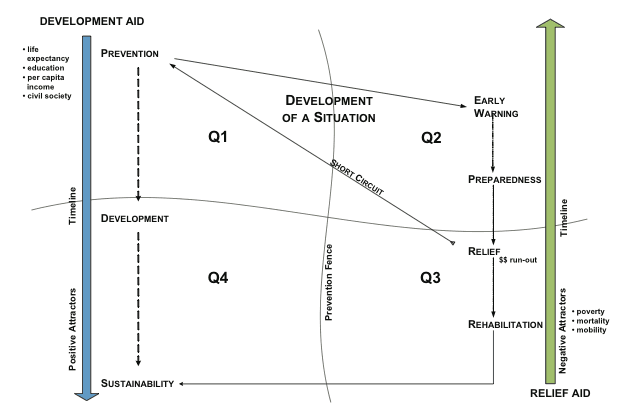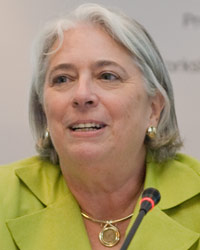Istanbul '09 Workshop
NGOs, Governments, and the Private Sector:
Increasing Cooperation to Achieve Success
Ms. Renée Acosta
CEO, Global Impact
The past three days of the conference have been inspiring and encouraging. Every time a panel concluded, I would rewrite my remarks to ensure I captured the essence of a different perspective. Certainly, much has been said about a comprehensive approach. The underpinning of a comprehensive approach is common sense. Often the most difficult aspect of a situation is to be able to step back and ask, what makes sense? It is important to distil a situation to the lowest common denominator and then build it up again. Going down to simplicity and then back to complexity usually makes it easier to develop a plan of action.
We need to think about Afghanistan from the perspective of what its people want, not necessarily from the viewpoint of what others want to impose. Certainly, the people of Afghanistan want peace and prosperity. One of the lessons I have learned in my 15 or 20 years of dealing with the poorest people on earth is that mothers want the same thing for their children everywhere. The opportunity to provide services and the efforts made to undertake programs vary by circumstances. The resources available vary. We must therefore keep in mind, what do the people of Afghanistan desire and how can we help in that regard? We all know that the problems are legendary and numerous and that we could spend hours listing them. But let’s move forward with developing a plan. Let’s figure out what can be accomplished and how to implement the plan to make sure that there is a future for the people of Afghanistan.
Humanitarian Relief & Development

THE CHALLENGES OF PROVIDING DEVELOPMENT AID
Let me refer you to the above diagram, which is an attempt to graph what really happens when we are trying to offer humanitarian relief and development aid. The quadrants are labelled Q1, Q2, Q3, and Q4. The most efficient way to deliver aid would be to begin in the top left corner of the diagram (development aid) and move linearly from prevention to sustainability, passing through phases of development. The ultimate goals are increased life expectancy, improved education, increased per capita income, and a civil society. Very straightforward.
Regrettably, what happens in the course of history is that we start out in prevention where we have productive discussions, look at different research studies, and begin to draft what actions might be taken in response to a humanitarian crisis. The next phase is when there is an early warning of a humanitarian event, either natural or manmade. Suddenly, there is political will, there is tremendous interest, and there is money. This causes response to move quickly to Q2. We are then into the preparedness and the relief effort, including the emergency provision of food, water, and shelter. But it is all crisis- oriented. Very quickly, as the crisis begins to abate from the humanitarian point of view, we short circuit right back to the top of prevention. The money and the political will have run out.
A UNIQUE OPPORTUNITY IN AFGHANISTAN
There is an opportunity in Afghanistan and that is to avoid the short circuit; everything I have heard over the last three days says that there is political will, there is funding available, and there is desire to help create a very different outcome. It can be done.
This is a halcyon moment. It is right now; it is right here. We have the support of the people who can influence the decisions and in many cases, who can even make the decisions. These are the people who can make that long-term commitment of at least 15 years that General George Joulwan spoke about. We do not have to view ourselves as being in the middle and having to start over; we can view ourselves as being a little bit further along.
BUILDING TRUST AND CONFIDENCE
How do we make sure we avoid the short circuit? How do we move forward? It does take a long-term commitment and it does take money. With a nod to all of the comments that have been made about the challenges and to the many ideas heard in individual conversations during the last three days, another important element is trust and confidence. How do we build that? We know it takes time. But most importantly, we have to understand that there are different points of view and that sometimes we have to agree to disagree; we need to allow people to hold ideas and beliefs that are different from our own, without letting that deter us from addressing the needs that exist.
To give a classic example, in the humanitarian aid world, relief is given with a blind eye to political affiliation. Assistance is provided to any person who is hungry or who needs shelter. The right or wrong of that is not debated or evaluated. There are different ways of thinking. In some cases, from a different perspective, this could be considered aiding and abetting the enemy. So if we are going to make a full-blown effort in Afghanistan, is there a willingness to deliver the necessary aid, regardless of the beliefs of the people who need help? This does not mean supporting criminality. But it is a concern that complicates the process of working together. We need to be willing to bridge these differences in viewpoints. This is only one example; there are many.
WORKING TOGETHER
Is the desired outcome for NATO to be able to withdraw from Afghanistan? Or, is the desired outcome to reduce mortality, increase life expectancy, and increase the average years of education? Are we aiming for an end date or an end state? This is a big question. Likewise, do we divide up the responsibilities? Is it best to allocate tasks in a “you do this, I will do that” manner and just proceed in our own linear fashion? Or, do we work together in tandem with frequent, honest, and meaningful communication that may dictate a change of action and a redirection? Can we be nimble; can we be responsive? These are very simple but very important questions.
The problems encountered in the delivery of humanitarian assistance are well-documented and we could spend the rest of the day giving examples of what is called the “ain’t it awful.” There is a tendency to dwell on the problems and say, “That was terrible, that problem happened, we had better not try again.” Again, I suggest the leapfrog approach. Each of us can readily cite problems, but future outcomes are what capture my attention-and from what has been said in the last three days, they also are what captures the attention of everyone else present at this conference. Let’s look to the future. Our panel suggested the focus on Afghanistan because it is perched on the precipice of success or failure and there has been a change in policy that can tip the balance in the direction of success.
Nobody challenges the value of pre-planning. The biggest challenge is the will to spend the time in advance so that when events unfold, we have had the discussions, we know what the choices are, and again, we can be nimble enough to move in an appropriate and meaningful direction. What often does not occur is the coordinated planning between the government, private sector, and NGOs. General George Joulwan mentioned that our organization has a long history of partnerships. While this is certainly positive, these tend to be either partnerships with the government or with the private sector, but not partnerships with all of the entities concerned. One exception is the Partnership for Lebanon that engaged the Department of State, private sector, and NGOs.
In other sessions, we have touched upon what the defense industry can do to help address some of the problems of rapidly changing environments. What can the private sector do to support humanitarian aid, which will in turn result in growing markets and increased prosperity for everyone worldwide, not just for the country being helped? Afghanistan is the opportunity to change the dynamic and there are some efforts currently underway. Some of them have been very sucessful and some of them not so successful. Let’s decide to change our independent approaches. We know we have political will, adequate funding, adequate interest, and adequate capacity. If we can agree upon and execute a comprehensive plan, we can overlook our differences and work together to achieve success. We can overlook who wins and who loses, and instead look at the country of Afghanistan as a whole as winning.

